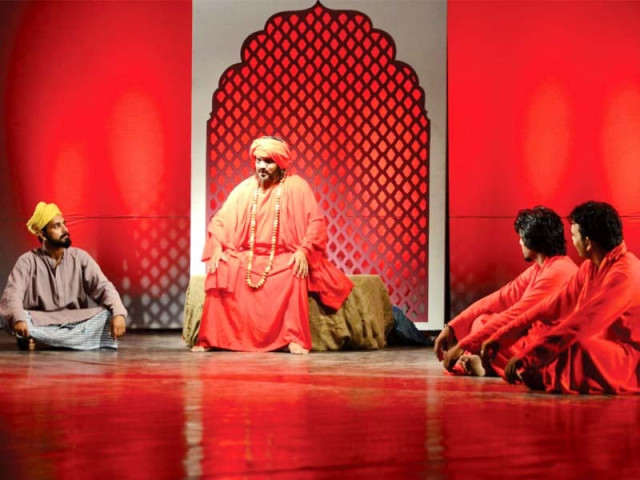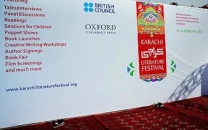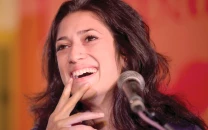Painting the stage red
‘Hussain the Weaver’ sheds light on rebels, poets and class wars of the 16th Century

The set was minimal, allowing the viewer to focus on the characters. PHOTO: PUBLICITY
Shah Hussain (played by Sarfraz Ansari) is in his mid-30s when the play begins. He is Sheikh Saadullah’s pupil and is taking a lesson on tafseer (interpretation), when he hears, “This world is a place to play.”
At this moment, Hussain runs out laughing and abandons the path of organised religion. He dances in a red dress as he sings to the audience about suffering and organised plundering of the peasantry during his time. “Wah wah!” rang out each time Shah spoke, followed by applause. It was involuntary.
https://instagram.com/p/7nV9cfFVejFv9NbbVODcalia_1JmZyFqPH5zk0/
Read: Baba Jalinoos exposed
A sub-plot of the two-hour play centers on Dullah Bhatti’s (played by Zohaib Haider) revolt against Mughal Emperor Jalaluddin Akbar (depicted by Waseem Ali). Bhatti’s father Farid was executed for opposing the new centralised land revenue collection scheme imposed by the emperor. Dullah, a Rajput from Pindi Bhattian, was born four months after his father died. Akbar offered royal patronage for Dullah to his mother (played by Zoya Qazi) to quell further dissent.
When Bhatti learns the truth of his father’s death, he understands the ‘peasant class war’ of his time and participates in it by taking from the rich and giving to the poor. He also opposes abduction and slave trade of women.
Primitive socialism is an underlying theme of Shabbir Ji’s script. He crafts the relationship between Shah Hussain and Brahman boy Madho (played by Mir Hamza) ingeniously. When questions are raised about homosexuality and sin, Shah Hussain’s smile does not waver as he responds with powerful prose and poetry.
https://instagram.com/p/7nXxlmFVR03U8bYQdhxPJ1RSSzdb-iCbRdork0/
Ansari, Hamza and Zohaib were perhaps the best actors from the performance. Hamza endeared Madho to the audience. Zohaib, with his sword and his defiant expression, was the rebel hero everyone rooted for.
Ansari, who also composed music for the play, had taken on a mammoth challenge when he was cast to play Shah Hussain. His vocals, his acting and his dancing showed that he was very close to the works of the poet he was portraying.
Talking to The Express Tribune, Ansari said he had been acting and singing for over 20 years. “I was introduced to Shah Hussain’s poetry long ago. His work is very close to my heart.”
Ansari stated Hussain’s life and works were relevant to the contemporary Pakistani society. “The rich are getting richer and the poor can barely sustain themselves,” he added. “The society is divided along class and religion. Hussain highlights these problems through his poetry,” he said.
As many as 17 kafis of Hussain were sung live during the play. The set was minimal, allowing the viewer to focus on the character. The play was mostly in Punjabi with humour laced in several scenes to break the tension.
Director Malik Aslam says Azad Theatre came together five years ago. “We have an office on Abbott Road which doubled as a rehearsal room,” he said. “We did not have funding or sponsors for the play,” he added. “The costumes worn by the actors were sewn by them. This effort extends beyond delivering a few lines on stage. The actors gave it their all.”
Published in The Express Tribune, September 17th, 2015.
Like Life & Style on Facebook, follow @ETLifeandStyle on Twitter for the latest in fashion, gossip and entertainment.



















COMMENTS
Comments are moderated and generally will be posted if they are on-topic and not abusive.
For more information, please see our Comments FAQ